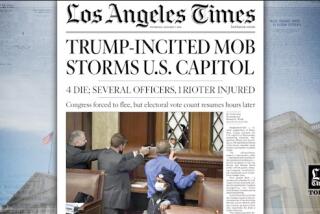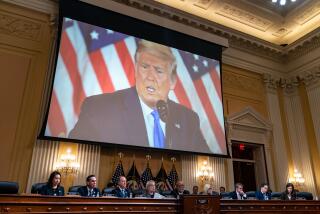Where’s the Passion Now for Iran-Contra Reforms?
- Share via
Once upon a time the American public was told that the Iran-Contra affair was an aberration. “Never again,” was the assurance by the President, the independent review board chaired by former Sen. John Tower and the joint congressional committee investigating the scandal.
There were some of us who disagreed with this finding and believed that strong action was required to regulate and oversee the use of covert action and secret diplomacy. However, as public concern about the scandal waned--Ronald Reagan was fond of saying that it didn’t matter at all to the folks living beyond the Washington Beltway--the pressure for reform lost much of its momentum.
The most far-reaching and significant reform was the proposed amendment to the National Security Act requiring that the congressional intelligence oversight committees be given prior notice of virtually all covert actions. In fast-breaking and rare circumstances in which the President determines that Congress cannot be informed in advance, the change in the law would require that Congress be notified no later than 48 hours after an operation had been approved.
Vigorously opposed by the CIA, these requirements would have assured that Congress received the timely notice of planned covert action operations that was missing in the Iran-Contra affair. After passing the Senate by a vote of 71-19 in March, 1988, and being favorably reported out of the House Permanent Select Committee on Intelligence in June, the amendment was taken off the calendar for a vote in the House in September and--as a gesture of bipartisanship by the leadership of the House--shelved when Congress reconvened in January
Speaker Jim Wright’s reasons for doing so were political. He apparently thought that he lacked the votes to pass the amendment over a presidential veto and that his own alleged breach of security in discussing U.S. covert actions in Central America at a press conference last in September had weakened the argument that Congress could be trusted to keep secrets.
But whatever motivated the Speaker’s decision, the fact remains that under present laws and executive orders, Congress still has no way to make sure that it is kept fully and currently informed of covert action plans.
Another cause of the Iran-Contra affair was the tendency of the President’s assistant for national security affairs and the assistants to that official (i.e., the NSC staff) to implement and manage policy.
The Tower Commission recommended that these tendencies should be vigorously resisted. But the commission also recommended that the national security adviser, and not the secretaries of state or defense, should chair the top-level interdepartment committees that formulate and decide national security policy. President Bush’s national security adviser, Gen. Brent Scowcroft, was a member of the Tower Commission and has done precisely what was recommended.
The problem is that the line between chairing such committees and advocating policy is easy to breach. Moreover, such advocacy often leads to a desire to at least manage, if not implement, the course of action selected.
By putting the national security adviser in charge of the meeting, President Bush virtually invites Scowcroft to take over when the inevitable disputes between the secretaries of state and defense threaten to stymie U.S. policy.
Of course, it can be argued that any system for making decisions in any organization can be flawed if the people who participate in it lack integrity. The principal finding of both the Tower Commission and the joint congressional committee was that the Iran-Contra affair resulted from the failure of individuals to observe the law.
True, Oliver L. North is awaiting a jury’s verdict, and former National Security Adviser John M. Poindexter is soon to go to trial. But the government has had to drop the most serious charges against North due to the fear that to prove its case, sensitive national security information might have to be revealed.
The government also opposed the right of North’s defense attorneys to require former President Reagan to testify. Consequently, the public will never really know if North was acting alone and without the approval of higher authority. So even if North is found guilty of the charges against him, he will be seen by many as a scapegoat.
Thus, it is highly questionable that the North trial will act as a deterrent to gung-ho officials in the future bent on using covert action as an alternative means of conducting U.S. foreign policy.
More to Read
Get the L.A. Times Politics newsletter
Deeply reported insights into legislation, politics and policy from Sacramento, Washington and beyond. In your inbox twice per week.
You may occasionally receive promotional content from the Los Angeles Times.






